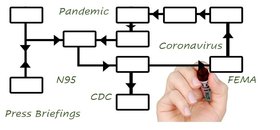As COVID-19 Rages, New Report Explores How to Better Protect Workers During Pandemics

Even as COVID-19 continues to rage across the United States, governments and industries are "reopening" the American economy. As a new report from the Center for Progressive Reform shows, in the absence of sufficient safeguards, this puts workers and the general public at heightened risk of contracting the deadly virus.
Read PDF Read Online
Protecting Workers in a Pandemic: What the Federal Government Should Be Doing

The "re-opening" of the American economy while the coronavirus that causes COVID-19 is still circulating puts workers at heightened risk of contracting the deadly virus. In some blue-collar industries, the risk is particularly acute because of the inherent nature of the work itself and of the workplaces in which it is conducted. And the risk, for a variety of reasons, falls disproportionately on people of color and low-income workers. With governors stay-at-home orders and other pandemic safety restrictions, CPR Member Scholars Thomas McGarity, Michael Duff, and Sidney Shapiro examine the federal government's many missed opportunities to stem the spread of the virus in the nation's workplaces, and make recommendations for what needs to happen next to protect employees on the job.
Read PDF Read Online
Author(s): Thomas McGarity, Michael C. Duff, Sidney Shapiro
Environmental Injustice & Impacts of COVID-19 on the Delmarva Peninsula

Read a fact sheet from CPR, Fair Farms, Sentinels of Eastern Shore Health, and the Sussex Health and Environmental Network prepared for a hearing of the Environment and Climate Change Subcommittee of the U.S. House Energy & Commerce Committee. The hearing focused on the environmental justice impacts of COVID-19 on the Delmarva Peninsula.
Read PDF
Author(s): Katlyn Schmitt
Webinar: Protecting Our Communities Through Sustainable Agriculture

Over the past two decades, Delmarva agriculture has shifted from traditional, diversified family farming to a more industrialized system of raising animals. Large, powerful companies dictate how animals are raised, processed, and sold and bear no responsibility for the public health impacts and environmental degradation in our local communities. The disastrous consequences have been highlighted, and in some cases exacerbated, by the current COVID-19 crisis. During a May 26, 2020, virtual town hall, regional experts and local community members shared the latest science, regulatory and policy actions, community perspectives, and possible solutions. The town hall was presented free with support from the Town Creek Foundation.
Read Online
Author(s): Darya Minovi
The Trump Administration’s Pandemic Response is Structured to Fail

Writing for the Regulatory Review, CPR Member Scholars Alejandro Camacho and Robert Glicksman describe the structural failings of the Trump administration's response to the coronavirus pandemic.
Read PDF
Author(s): Alejandro Camacho, Robert Glicksman
Remarks of Katie Tracy at OSHA Whistleblower Stakeholder Meeting

Katie Tracy’s testimony to OSHA, delivered virtually, during a Whistleblower Stakeholder Meeting, recommending several improvements the agency should make to its Whistleblower Protection Program.
Read PDF
Author(s): Katie Tracy
Letter to Congressional Leaders Opposing Coronavirus Liability Shield

Responding to Majority Leader Mitch McConnell's threat to attach to a future stimulus bill a liability shield for companies that fail to protect workers or consumers from the coronavirus, CPR Member Scholars and staff wrote to congressional leaders urging that they not interfere with the ability of workers, consumers, and members of their families to hold businesses accountable when their unreasonably dangerous actions have caused them to contract COVID-19.
Read PDF
Author(s): James Goodwin
Beware efforts absolving companies of COVID-19 liability

Writing in the Waco Tribune, Thomas McGarity warns that Sen. Mitch McConnell's effort to extend a federal COVID-19 liability shield over businesses will endanger workers' lives. Such immunity from accountability would allow employers to force workers to choose between losing their jobs or returning to workplaces where they are not sufficiently protected from the coronavirus.
Read PDF
Author(s): Thomas McGarity
Comments to OSHA on Improving the Whistleblower Protection Program

Comment letter to OSHA ahead of its Whistleblower Stakeholder Meeting on May 12, 2020, providing recommendations on how the agency can address key issues and improve its administration of the Whistleblower Protection Program.
Read PDF
Author(s): Katie Tracy
More Needs to Be Done to Protect Our Meat and Poultry Workers

In the Baltimore Sun: President Donald Trump invoked the Defense Production Act to order meat and poultry plants to continue operating despite COVID-19 outbreaks, exposing Maryland's poultry workers to enormous risks. Poultry processors haven't demonstrated they're able to keep workers safe and healthy, but they know that many of these low-wage workers will be forced to return. To top it all off, one of the president's goals with this order was to provide legal immunity to companies, so that they can't be sued by employees who are infected as a result of unsafe working conditions.
Read PDF Read Online
Author(s): Matt Shudtz, Rachel Micah-Jones
